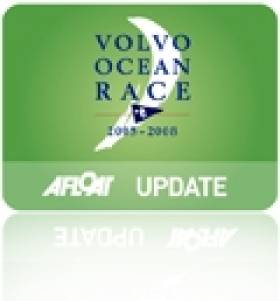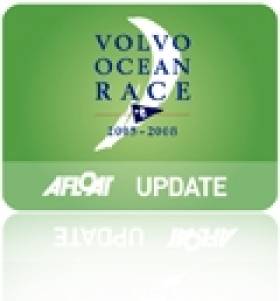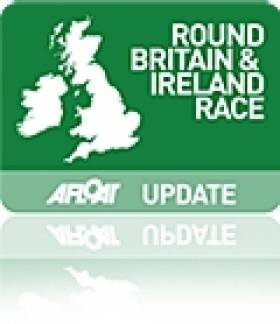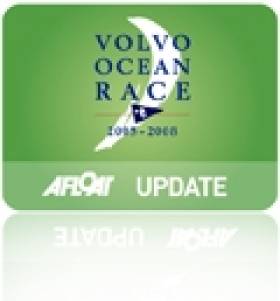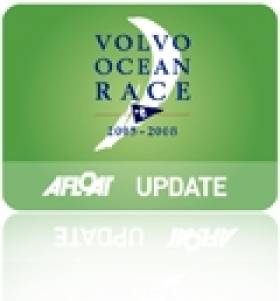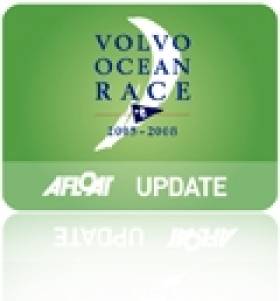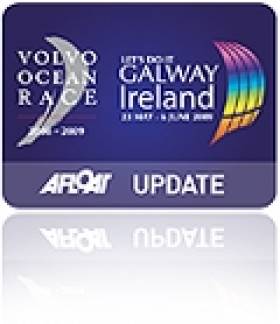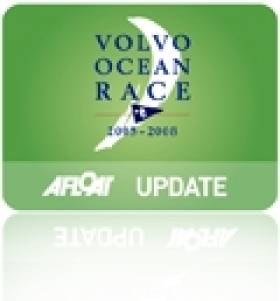Displaying items by tag: Abu Dhabi Ocean Racing
Volvo Ocean Race Leg Three Sets Up For Thrilling Finish in Sanya, China
#vor – A thrilling finish looks to be in store for Leg 3 of the Volvo Ocean Race after the chasing pack made big inroads into Dongfeng Race Team's once huge lead early on Sunday with just over 24 hours to sail to the finish in Sanya.
Charles Caudrelier's (FRA) crew led by more than 106 nautical miles (nm) approaching the Malacca Strait but gradually their advantage has been clawed back with under 350nm left of this fascinating stage from Abu Dhabi to Sanya on the southernmost tip of China.
Understandably, the French skipper and his team have been feeling the pressure as the chasing pack led by Abu Dhabi Ocean Racing (Ian Walker/GBR) threatened their hopes of becoming the first Chinese-backed team to win a leg in offshore sailing's most prestigious round-the-world race.
Victory in the 4,670nm stage, which started on January 3 in Abu Dhabi, would also put Dongfeng Race Team top of the overall standings on five points ahead of Abu Dhabi Ocean Racing and Team Brunel who won Legs 1 and 2 respectively.
"Onboard Dongfeng we must stay concentrated ... the finish line is still a long way away," Caudrelier had warned in a blog from the boat as the fleet headed towards the Vietnamese coast before the weekend.
At 1240 UTC on Sunday, they had a lead of 34nm over Leg 1 winners Abu Dhabi Ocean Racing with Team Alvimedica (Charles Enright/USA), MAPFRE (Xabi Fernández/ESP) and Team Brunel (Bouwe Bekking/NED) hot on their heels too within 50nm of the Dongfeng boat.
Team SCA (Sam Davies/GBR) have been making good gains too, lying 69.2nm behind the leaders.
Game face: Justin Slattery is focused on closing out a podium place on Leg 3. #inabudhabi #goazzam #VolvoOceanRace pic.twitter.com/ymSXZzLAWk
— AbuDhabiOceanRacing (@ADORlog) January 25, 2015All the fleet had been slaloming back and forth with gybe after gybe to avoid the numerous obstacles, including a series of near misses with fishing vessels and their nets just off the Vietnamese coast.
Walker described that process during Saturday night as "possibly the single hardest night of the race" while Enright went further: "It was the most intense night of sailing of my entire life."
The sailors are heading for an amazing welcome in Sanya. The Race Village opened on Saturday to large crowds and is sure to repeat last edition's (2011-12) fantastic receptions for the fleet no matter what time of day or night they arrive.
Abu Dhabi's Former VOR Yacht Destroyed By Fire
#VOR - Abu Dhabi Ocean Racing's former Volvo Ocean Race yacht has been destroyed by a fire at its shipyard in France.
As Italian nautical news site Solovela reports, firefighters battled through incredible heat and toxic fumes last Friday night (16 January) to put out the blaze that engulfed the VOR 70 Azzam.
The yacht – which placed fifth in the last edition of the Volvo Ocean Race with a crew including current race skipper Ian Walker and bowman Justin Slattery – was being stored in a shed at a naval shipyard in Cogolin, on the French Riviera near Saint-Tropez.
The intense heat of the fire left little to salvage from the Italian-built yacht, melting most of the hull and leaving only the boom intact.
Abu Dhabi VOR Yacht Breaks Round Britain & Ireland Monohull Record
#rorcsrbi –Abu Dhabi Ocean Racing's Volvo Ocean 65, Azzam, skippered by Ian Walker, crossed the finish line of the 2014 Sevenstar Round Britain and Ireland Race off the Royal Yacht Squadron, Cowes at 22.20.28 BST on Friday 15th August 2014 with an elapsed time of 4 days, 13 hours, 10 minutes, 28 seconds.
This breaks the previous World Record and Race Record for a monohull set by Volvo 70 Groupama, in 2010, by 1 day, 08 hours, 16 minutes and 27 seconds. Azzam's record is subject to ratification by the World Speed Sailing Record Council.
This is the second World Record broken during the 2014 Sevenstar Round Britain and Ireland Race organised by the Royal Ocean Racing Club.
#VOLVO OCEAN RACE - Abu Dhabi Ocean Racing secured their first leg victory of the Volvo Ocean Race last night in Portugal - pipping Groupama to the post by less than six minutes.
"It's one of the most amazing experiences of my sailing career," said Abu Dhabi skipper Ian Walker after the 12-day, 3,500-nautical-mile race from Miami to Lisbon.
Wexford's own Justin Slattery joined his crewmates for a well-deserved celebration on the dockside after their remarkable close finish in a race that has been dogged by demastings and other setbacks since it began late last year.
But it wasn't even the closest finish last night, as Team Telefónica took fourth place a mere 1 minute 42 seconds ahead of CAMPER with Emirates Team New Zealand, who dramatically stalled just metres from the line.
The finish sees Groupama - which features Kerry sailor Damian Foxall on deck - move to first place in the overall scoreboard with 183 points, the first to grab the top spot from Telefónica since the first leg last November.
VOR Second Leg Cut Short Over Piracy Concerns
#VOLVO OCEAN RACE - The second leg of the Volvo Ocean Race from Cape Town to Dubai has been cut short by organisers as a result of the growing threat of piracy in the Indian Ocean, The Irish Times reports.
The six yachts competing will be protected by armed guards as they are shipped on a secret route to the United Arab Emirates due to piracy concerns.
The boats will be transported by ship from an undisclosed location to Sharjah in the Arabian Gulf, from where they will sprint to the finish line in Abu Dhabi.
All six teams are currently in Cape Town, with Team Sanya, PUMA and Abu Dhabi Ocean Racing hoping to get back in the race after retiring in the first leg.
As previously reported on Afloat.ie, NATO recently foiled a pirate attack on a Spanish fishing vessel between the Seychelles and the Somali coast.
The Irish Times has more on the story HERE.
Abu Dhabi Team Suffer Broken Mast Six Hours Into VOR
#VOLVO OCEAN RACE - Abu Dhabi Ocean Racing's challenge was nearly scuppered at the outset when their yacht suffered a broken mast just hours into the first leg of the Volvo Ocean Race yesterday. Dismast photos by Paul Todd below.
The accident occurred 30 nautical miles south of Cartagena on the Spanish Mediterranean, when the yacht Azzam encountered rough weather some six hours after leaving Alicante.
"Our mast broke into three pieces when landing off a big wave in 30+ knots of wind," said skipper Ian Walker. "We were sailing under a J4 and two reefs. We do not as yet know the cause."
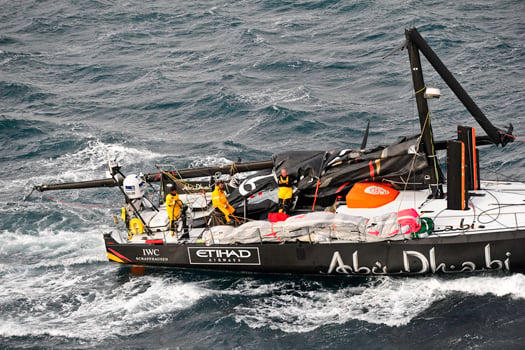
A first leg disaster for Ian Walker on Abu Dhabi - Photo: Paul Todd
The broken mast pieces and rig were recovered, thanks to the "courageous" intervention of crewman Wade Morgan, who entered the water to cut away the top of the mainsail.
Walker added: “The mast from the first spreader up is now secured to the port side of the boat. About three or four metres protrude from behind the boat. A spider web of lines is keeping the operation intact. The crew are deeply disappointed.”
Yacht and crew - which includes Wexford man Justin Slattery - were last night headed towards the flatter water at Cabo de Palos before returning to Alicante under motor to begin repairs and get back in the race.
Abu Dhabi Ocean Racing are one of six teams competing in the epic round-the-world yacht race, which is set to finish in Galway next July.
Earlier this week the team finished first in the initial in-port race of the competition.
The official Volvo Ocean Race website has more on the story HERE.
Irish Sailors Get Ready for First VOR In-Port Races
The first of the in-port races ahead of the Volvo Ocean Race start tomorrow in Alicante – and top Irish sailors are among the six teams competing.
Wexford’s Justin Slattery is on Abu Dhabi Ocean Racing, which is competing in the race for the first time.
Skipper Ian Walker told Sail World: "Everything is ready and we can’t wait to line up against the other teams... The forecast is for strong breeze on Saturday so there will be extra pressure on the crew to get it right."
The team has another Ireland connection in its commercial director David Hassett, a veteran of the Irish yachting scene and backer of Ireland's Green Dragon team in the 2009 race.
Elsewhere, Kerryman Damian Foxall is a watch leader on Groupama, captained by debuting VOR skipper Franck Cammas - who last month received one of France's most prestigious sporting honours.
Meanwhile, the Chinese entry Team Sanya, which is part sponsored by Discover Ireland, is hoping skipper Mike Sanderson - who took Telefónica Blue to the podium at every stage in the 2009-09 race - can repeat his past successes.
In-port races take place in all 10 host ports along the 39,000-nautical-mile route, and as they account for more than 20% of the points, no team will be taking them easy.
As previously reported on Afloat.ie, a delegation from Galway - hosts of the final stage of the race next summer - will be in Spain for a week of events beginning tomorrow ahead of the start of the race proper on 5 November.
Sail World has more on the story HERE.
Green Dragon Backer Works His Magic for VOR in Abu Dhabi
Abu Dhabi's The National has an interview with David Hassett, commercial director of Abu Dhabi Ocean Racing and Irish yachting veteran, ahead of the city's hosting of the Volvo Ocean Race.
Hassett was instrumental in bringing the race to Galway in 2009, and was one of the team behind the Green Dragon, Ireland's underdog entry which took the yachting world by surprise by clinching three podium finishes.
This time round, Hassett is hoping to work similar magic for Abu Dhabi as it hosts a stopover of the next Volvo Ocean Race at the end of the year - and enters its own yacht in the competition, with at least one Emirati crewman on board.
As commercial director, 40-year-old Hassett - originally from Cork and a championship sailor in his youth - is responsible not only for raising funds, but making sure that his sponsors get the best return on their investment. And that means getting their race entry seen.
"It's my job to ensure that the billboard is effective," he says. "Everywhere the boat goes, the name Abu Dhabi goes and it becomes synonymous."
Top pritority for Hassett is marketing Abu Dhabi as a "winter watersports destination", and encourage more people in the region to get off their jet skis and into sailing.
The National has more on the story HERE.


























